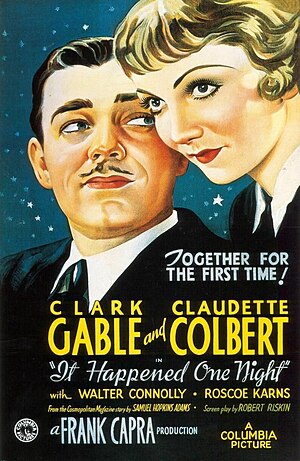It Happened One Night
Jump to navigation
Jump to search
| This article was copied (instead of imported) from the now-deleted Miraheze wikis. |
| It Happened One Night | ||||||||||||||||||
|---|---|---|---|---|---|---|---|---|---|---|---|---|---|---|---|---|---|---|
This film has been preserved in the National Film Registry in 1993.
| ||||||||||||||||||
 | ||||||||||||||||||
|
It Happened One Night is a 1934 pre-Code American romantic comedy film with elements of screwball comedy directed and co-produced by Frank Capra, in collaboration with Harry Cohn, in which a pampered socialite (Claudette Colbert) tries to get out from under her father's thumb and falls in love with a roguish reporter (Clark Gable). The screenplay by Robert Riskin is based on the August 1933 short story "Night Bus" by Samuel Hopkins Adams, which provided the shooting title. Classified as a "pre-Code" production, the film is among the last romantic comedies created before the MPPDA began rigidly enforcing the 1930 Motion Picture Production Code in July 1934. It Happened One Night was released just four months prior to that enforcement.
Why It Rocks
- The film's stated to be one of -- if not the -- first proper example of a romantic comedy set on film. Before the main pair can officially become an item, the film makes the dynamic duo overcome often humorous obstacles throughout several misadventures until they're actually ready for each other. This includes Ellie's controlling father, hitching several rides hitch, evading a search party, tricking some policemen, annulling a marriage, outwitting a thief, scaring off a perv, among other things. A lot of their antics are surprisingly undated.
- In lesser hands, the film probably would have been little more than a low-rate farce, but thanks to the masterclass work from Frank Capra, his brilliant screenwriter Robert Riskin, and his masterful cinematographer Joseph Walker, the film became a statement about social class, surviving the worst effects of the Depression, and even a commentary about America itself.
- Even though the film's basically a screwball narrative’s excuse for a road trip involving two mismatched protagonists, in reality the movie went well beyond what many other directors had achieved up until that point in comedic social melodrama. In addition, the Taming of the Shrew storyline turned the, until then, usual lower class female lead looking for salvation from a dominant patriarch on its head.
- The film's ability to overcome the moral strictures that were now permeating Hollywood thanks to the Production Code and have its wholesomeness trump the prospect of a married woman eloping with an unemployed man, were part of the movie’s brilliance. With the film being released at the height of the Great Depression, it tackles a lot heavy themes, including injustice, privilege, and poverty. Pretty intense for an early rom-com. Although the film had also served as a beacon of relief thanks to its unique way of putting a light hearted spin on the serious issues.
- Peter Varne and Ellie Anders both manage to be sympathetic and relatable despite committing a lot of questionable actions. They're even sympathetic to audiences who wouldn’t necessarily fraternize with their kind.
- Claudette Colbert and Clark Gable pull off some of their most talented and memorable performances as the lead pair. This time around, the leading man and woman were allowed to be both funny and dreamy, rather than assigning all the humor to supporting actors, unlike various previous films of the time.
The Only Bad Quality
- The film has quite a bit of gaffes going for it:
- Food appears and disappears at a breakfast table.
- Drivers switch places in the middle of scenes
- Scarves change position from shot to shot
- Several times actors are seen mouthing dialogue erased from the soundtrack
- There's even a scene where an action's repeated with a shot of Colbert bolting to her left cutting to a different angle of Colbert bolting to her left.
Trivia
- It Happened One Night is the first screwball comedy.
Comments
Loading comments...